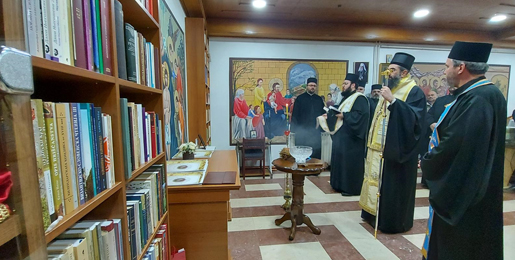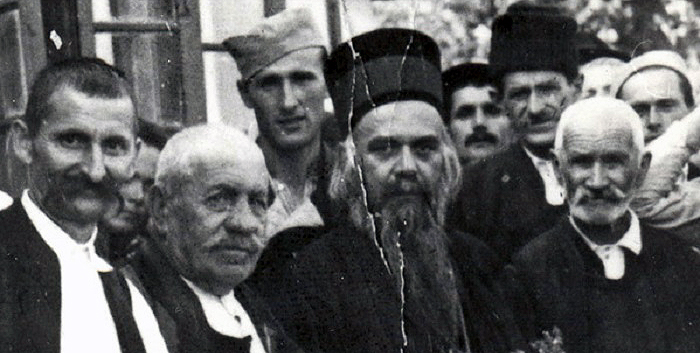Culture
Nis: Library „Elder Nikanor of Chilandar“ opens
4. March 2021 - 20:07 With the blessing of His Grace Bishop Arsenije of Nis a library "Elder Nikanor of Chilandar" opened at the parish house of the church of the Resurrection of Christ within the Chilandar's metochion in Nis, on 4 March 2021.
With the blessing of His Grace Bishop Arsenije of Nis a library "Elder Nikanor of Chilandar" opened at the parish house of the church of the Resurrection of Christ within the Chilandar's metochion in Nis, on 4 March 2021.
His Grace Bishop consecrated the premises of the Library with the concelebration of archpriest Miodrag Pavlovic, Diocesan dean of Nis I, and deacon Djordje Filipovic with archpriest Dejan Krstic, professor of the Seminary of Sts. Cyril and Methodius, who sang responses.
Unveiling of the monument to Stefan Nemanja
29. January 2021 - 13:47This is not just an act of unveiling a monument to our father, the creator of the state, the saint, and the one from who it all began. This is a kind of act of being accountable to ourselves and our identity, what we have learned, what we know and where we are going. Long live Serbia !, President of the Republic of Serbia Mr. Aleksandar Vucic said.
In the center of Belgrade, near the former Railway station, a monument to Stefan Nemanja (Venerable Simeon the Myrrh-Gusher), the Grand Prince (veliki župan) and one of the greatest Serbian rulers, was ceremoniously unveiled on 27 January 2021, on the feast day of Saint Sava.
President Aleksandar Vucic said that since Stefan Nemanja until today, the Serbian people have been a state-building people. "Without the awareness that there was someone before us - someone who had dreams we live today - no dream of the future is possible", the President pointed out. The ceremony was attended by Their Graces Bishops: Jovan of Sumadija and the administrator of the Archbishopric of Belgrade and Karlovci; Irinej of Backa, David of Krusevac, Stefan of Remesiana and Isihije of Mohacs.
Saint Sava College, the first Serbian school in Australia, is officially open
28. January 2021 - 11:55The first issue of the journal Nicholai Studies
5. January 2021 - 15:30 “Tucindan — the birthday of someone who is destined to wander around the world” (“Tucindan” — a Serbian traditional pre-holiday two days before Christmas, and here a wordplay which Velimirovich used: it could be rendered as “the day of wanderers.” In this manner, Bishop Nicholai dated a letter which he sent from Lakavana to Fr. Aleksa Todorović in Munich on January 5, 1952 — cf. CW, XIII, 687)
“Tucindan — the birthday of someone who is destined to wander around the world” (“Tucindan” — a Serbian traditional pre-holiday two days before Christmas, and here a wordplay which Velimirovich used: it could be rendered as “the day of wanderers.” In this manner, Bishop Nicholai dated a letter which he sent from Lakavana to Fr. Aleksa Todorović in Munich on January 5, 1952 — cf. CW, XIII, 687)
On the 140th anniversary of the birth of Nicholai Velimirovich, the first issue of the journal Nicholai Studies has been published. Both printed and digital copy of the first issue of Nicholai Studies are stored in the Repository of the National Library of Serbia: http://repozitorijum.nb.rs/repozitorijum.aspx?issn=2738-1064 The journal is available online as an open-access publication: https://nicholaistudies.org/ The next issue of the journal is scheduled for the second half of the year. The next issue will be published in English and Serbian.
Aristotle in Byzantium
30. December 2020 - 10:46 By: Mikonja Knezevic
By: Mikonja Knezevic
The reception of Ancient Greek Philosophy in Christian thought was for a long time considered under the “pro-crustean” scheme of “Platonic East” and “Aristotelean West”. However, through different studies, books, and critical editions it has been shown that Aristotle—whether he was neglected as kakotechnos or, again, treat-ed in a more affirmative way—was very well-known not only in the West but also in the Eastern Roman Empire. This fact is testified by generations of authors adopting, adapting, commenting, and criticizing the Stagirite, whose works have survived through over than 1000 of Byzantine manuscripts. This volume offers twelve scien-tific studies on different topics of Aristotelean philoso-phy that are to be found in Patristic writers and Byzan-tine philosophers. These studies show that the Stagirite was vividly present in Eastern Roman Empire from the first centuries of its existence till the Fall of Constantinople, which means that one may even speak of an uninterrupted tradition of commenting Aristotle in Byzan-tium. The volume can be treated as some kind of continuation of a previously published book The Ways of Byzantine Philosophy.
John Chrysostom on the Roman Empire: A study on the Political Thought of the Early Church
30. December 2020 - 10:43 By: Constantine A. Bozinis
By: Constantine A. Bozinis
During the 20th century, the patristic scholarship was only able to address the political thought of John Chrysostom in a piecemeal fashion. The present study constitutes the first systematic attempt to remedy this situation by providing a more all-encompassing view of the great Church Father's thinking about public life in Christian antiquity. Its first part is devoted to Chrysostom's perception of the relationship between Church and state. His view of his time's central state authority, the Roman Empire, is carefully reconstructed from select passages in his homiletic corpus. Particular care is taken to highlight the substantial differences between John Chrysostom and Eusebius of Caesarea insofar as their attitude toward the Roman Εmpire is concerned; these differences become visible primarily in the way that the two ecclesiastical authors make use of the motif of "synchronic parallelism," that is to say, the temporal coincidence of Jesus' birth with Octavius Augustus' autocracy and the spread of the Pax Romana throughout the entire Mediterranean world.

